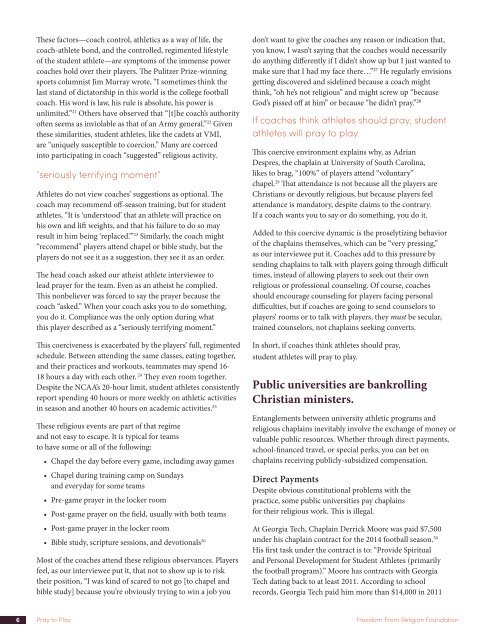Pray Play
PraytoPlayReport
PraytoPlayReport
Create successful ePaper yourself
Turn your PDF publications into a flip-book with our unique Google optimized e-Paper software.
These factors—coach control, athletics as a way of life, the<br />
coach-athlete bond, and the controlled, regimented lifestyle<br />
of the student athlete—are symptoms of the immense power<br />
coaches hold over their players. The Pulitzer Prize-winning<br />
sports columnist Jim Murray wrote, “I sometimes think the<br />
last stand of dictatorship in this world is the college football<br />
coach. His word is law, his rule is absolute, his power is<br />
unlimited.” 21 Others have observed that “[t]he coach’s authority<br />
often seems as inviolable as that of an Army general.” 22 Given<br />
these similarities, student athletes, like the cadets at VMI,<br />
are “uniquely susceptible to coercion.” Many are coerced<br />
into participating in coach “suggested” religious activity.<br />
“seriously terrifying moment”<br />
Athletes do not view coaches’ suggestions as optional. The<br />
coach may recommend off-season training, but for student<br />
athletes, “It is ‘understood’ that an athlete will practice on<br />
his own and lift weights, and that his failure to do so may<br />
result in him being ‘replaced.’” 23 Similarly, the coach might<br />
“recommend” players attend chapel or bible study, but the<br />
players do not see it as a suggestion, they see it as an order.<br />
The head coach asked our atheist athlete interviewee to<br />
lead prayer for the team. Even as an atheist he complied.<br />
This nonbeliever was forced to say the prayer because the<br />
coach “asked.” When your coach asks you to do something,<br />
you do it. Compliance was the only option during what<br />
this player described as a “seriously terrifying moment.”<br />
This coerciveness is exacerbated by the players’ full, regimented<br />
schedule. Between attending the same classes, eating together,<br />
and their practices and workouts, teammates may spend 16-<br />
18 hours a day with each other. 24 They even room together.<br />
Despite the NCAA’s 20-hour limit, student athletes consistently<br />
report spending 40 hours or more weekly on athletic activities<br />
in season and another 40 hours on academic activities. 25<br />
These religious events are part of that regime<br />
and not easy to escape. It is typical for teams<br />
to have some or all of the following:<br />
• Chapel the day before every game, including away games<br />
• Chapel during training camp on Sundays<br />
and everyday for some teams<br />
• Pre-game prayer in the locker room<br />
• Post-game prayer on the field, usually with both teams<br />
• Post-game prayer in the locker room<br />
• Bible study, scripture sessions, and devotionals 26<br />
Most of the coaches attend these religious observances. <strong>Play</strong>ers<br />
feel, as our interviewee put it, that not to show up is to risk<br />
their position, “I was kind of scared to not go [to chapel and<br />
bible study] because you’re obviously trying to win a job you<br />
don’t want to give the coaches any reason or indication that,<br />
you know, I wasn’t saying that the coaches would necessarily<br />
do anything differently if I didn’t show up but I just wanted to<br />
make sure that I had my face there…” 27 He regularly envisions<br />
getting discovered and sidelined because a coach might<br />
think, “oh he’s not religious” and might screw up “because<br />
God’s pissed off at him” or because “he didn’t pray.” 28<br />
If coaches think athletes should pray, student<br />
athletes will pray to play.<br />
This coercive environment explains why, as Adrian<br />
Despres, the chaplain at University of South Carolina,<br />
likes to brag, “100%” of players attend “voluntary”<br />
chapel. 29 That attendance is not because all the players are<br />
Christians or devoutly religious, but because players feel<br />
attendance is mandatory, despite claims to the contrary.<br />
If a coach wants you to say or do something, you do it.<br />
Added to this coercive dynamic is the proselytizing behavior<br />
of the chaplains themselves, which can be “very pressing,”<br />
as our interviewee put it. Coaches add to this pressure by<br />
sending chaplains to talk with players going through difficult<br />
times, instead of allowing players to seek out their own<br />
religious or professional counseling. Of course, coaches<br />
should encourage counseling for players facing personal<br />
difficulties, but if coaches are going to send counselors to<br />
players’ rooms or to talk with players, they must be secular,<br />
trained counselors, not chaplains seeking converts.<br />
In short, if coaches think athletes should pray,<br />
student athletes will pray to play.<br />
Public universities are bankrolling<br />
Christian ministers.<br />
Entanglements between university athletic programs and<br />
religious chaplains inevitably involve the exchange of money or<br />
valuable public resources. Whether through direct payments,<br />
school-financed travel, or special perks, you can bet on<br />
chaplains receiving publicly-subsidized compensation.<br />
Direct Payments<br />
Despite obvious constitutional problems with the<br />
practice, some public universities pay chaplains<br />
for their religious work. This is illegal.<br />
At Georgia Tech, Chaplain Derrick Moore was paid $7,500<br />
under his chaplain contract for the 2014 football season. 30<br />
His first task under the contract is to: “Provide Spiritual<br />
and Personal Development for Student Athletes (primarily<br />
the football program).” Moore has contracts with Georgia<br />
Tech dating back to at least 2011. According to school<br />
records, Georgia Tech paid him more than $14,000 in 2011<br />
6 <strong>Pray</strong> to <strong>Play</strong> Freedom From Religion Foundation


